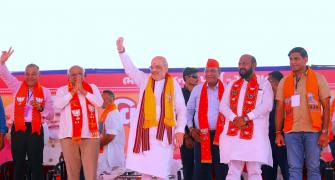Harvard University has launched a programme, what it calls a bold new vision for engagement with South Asia. On November 14, the university unveiled the most ambitious expansion of research and education related to the subcontinent.
It said the project entails unprecedented university-wide collaboration, including Harvard College and Harvard's 10 academic units -- on a host of new programs related to the region.
According to Harvard, its plans for expanded engagement with South Asia had been developed by senior scholars and administrators from the university and leaders from the public and private sectors around the world.
The plan came just a month after Drew Gilpin Faust was officially made the 28th president in Harvard's history. Thus this project becomes the first region-wide international initiative of the Faust administration.
Repating points made in her inaugural speech in October, Faust said that accountability to the future requires that Harvard increasingly leap geographic as well as intellectual boundaries and hence "one of my priorities as president is the university's engagement with societies throughout the world."
"Our unprecedented expansion of scholarly engagement with the people, cultures, institutions, and economies of South Asia will enable us to contribute to the continued development of this critically important region while simultaneously learning from its rich past," she said.
Professor Jorge I Dominguez, Vice Provost for International Affairs and one of the architects of the South Asia project, said, "This approach to South Asia is the most fully developed plan related to any geographic region outside the US and will provide important lessons to help inform Harvard's approach globally."
He predicted that "the systematic collaboration inherent in our approach to South Asia holds the potential to serve as a template for the university in other geographic regions of the world. South Asia is very much a model for us."
Immediately after the announcement of the launch, Dominguez told rediff.com, "I am thrilled. This is something that several of us have been working together and in many ways the main accomplishment is to get Harvard faculty and senior administrators of the university to agree that South Asia really matters and that this is a central concern for the university agenda going forward."
Dominguez, a Harvard faculty member for the past 30 years, and for the past decade has served as the director of the Weatherhead Center for International Studies-Harvard's largest research center-said, "The difference is not that the study of South Asia at Harvard just began.
"The difference is a commitment by faculty, and the president of the university, provost of the university, that we want to make sure that this is better coordinated, better supported, as it goes forward and that it is a sustained university-wide commitment."
The implementation of this project will be guided by a steering committee comprised of eight senior scholars from across the university, headed by Professor Sugata Bose, Director of the South Asia Initiative and the Gardiner Professor of Oceanic History and Affairs at the Faculty of Arts & Sciences, and also including Nobel Laureate Professor Amartya Sen, the Thomas W Lamont University Professor, also with the same Faculty.
Working with Dominguez, this group will set the academic agenda related to South Asia, facilitate multidisciplinary engagement in research relevant to the region, and expressly knit diverse elements of the university's South Asia-focused academic and research programs into a more cohesive whole.
"India may well be seen, in today's public discussion, merely as China's alter-ego, but South Asia's long history and rich traditions deserve serious study, for which Harvard can be a wonderful base," Sen said.
Bose acknowledged that while Harvard has several South Asia programs and exchanges and "has even been teaching Sanskrit from 1872," what this new project would do will "be taking it to a completely new level."
"We are creating new synergies across the Harvard schools where they may not have existed to the same extent before", he told rediff.com.
"In fact, we expect that the name South Asia Initiative will change to South Asia Institute at the end of the academic year," he said.






